#holy raiment
Text
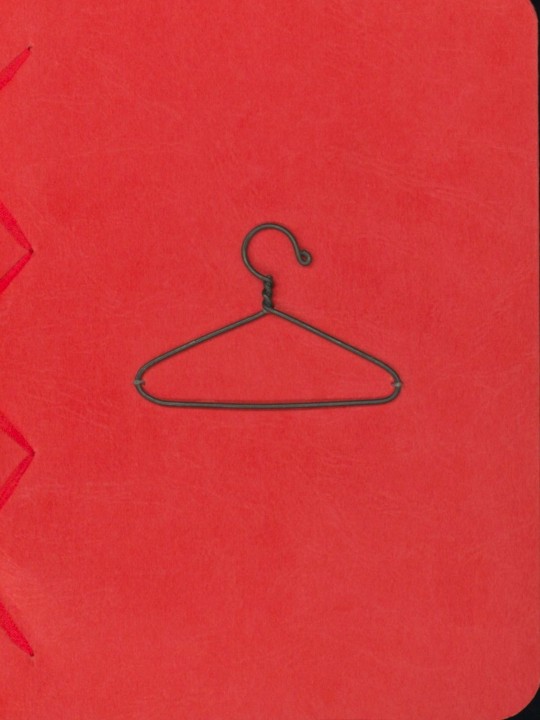
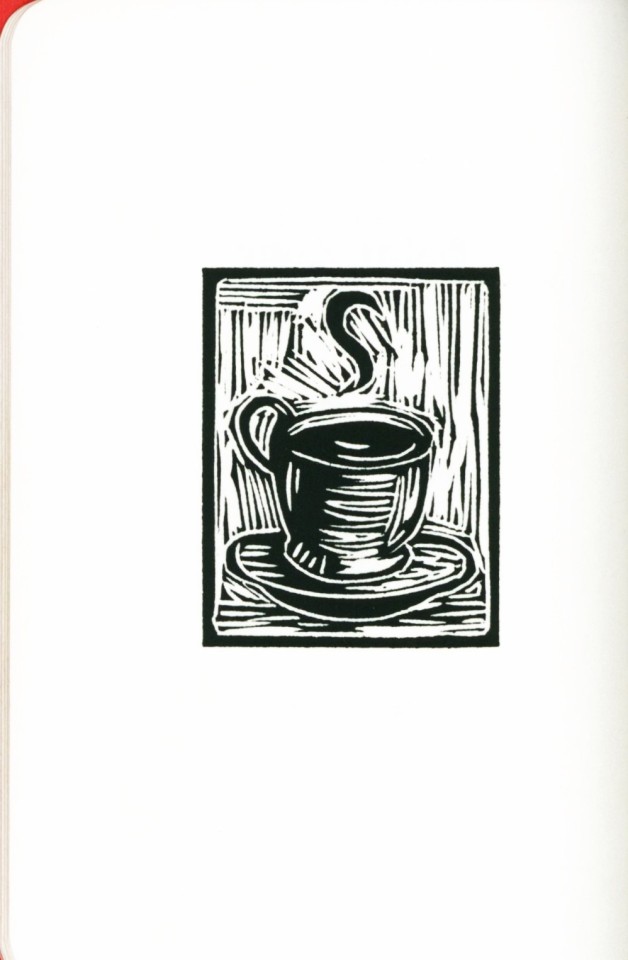
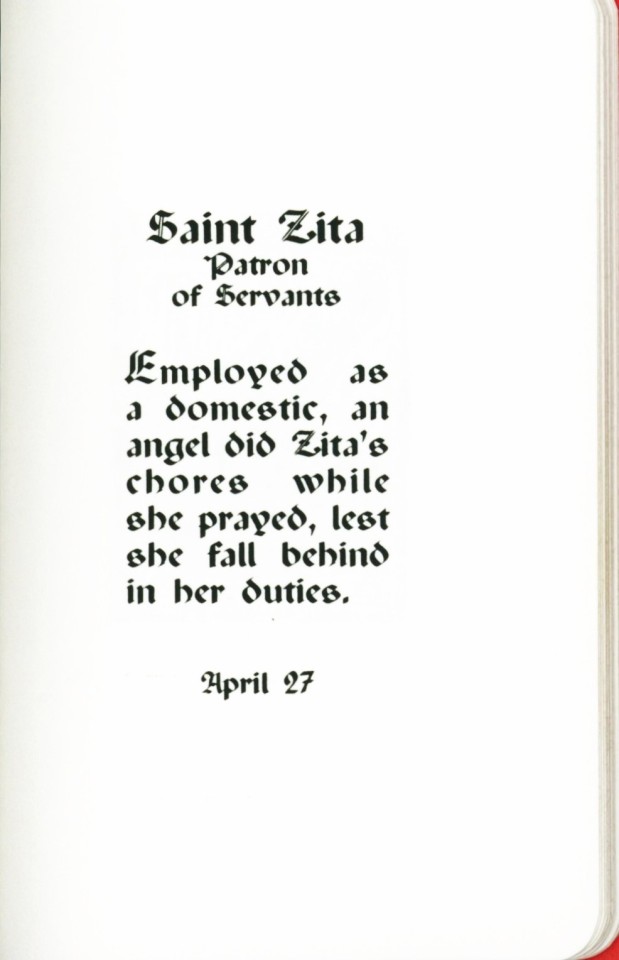
Staff Pick of the Week
The semester is once again ending, and I fear we need all the help we can get to make it through these trying weeks. On that note, I bring you some help from the saints through Steven M. Krueger's Holy Raiment. Created by the artist after being inspired by letterpress and advanced fiber arts classes here at UWM, this book pairs relief prints of various objects with a corresponding saint to create a work reminiscent of a prayer book.
Of the book's construction, the artist explains:
The intimate size and shape of the reference intentionally recalls a prayer book, complete with silk ribbon marker. The hand carved imagery opposite the corresponding text serves as the identifying attribute, in keeping with the practice of representing each saint with a specific symbol or emblem. Researched and studied, this attention to details reinforced the religious theme.
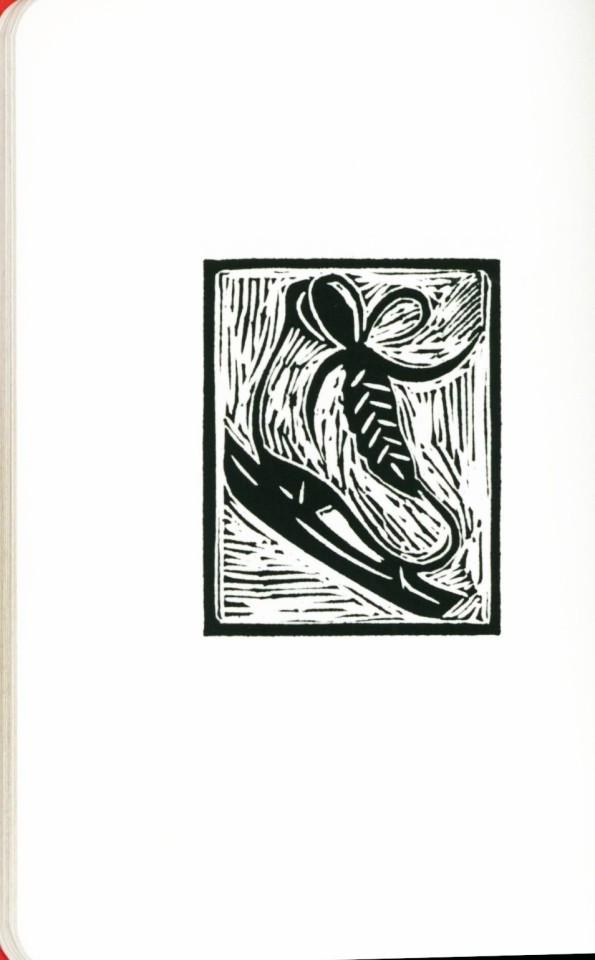
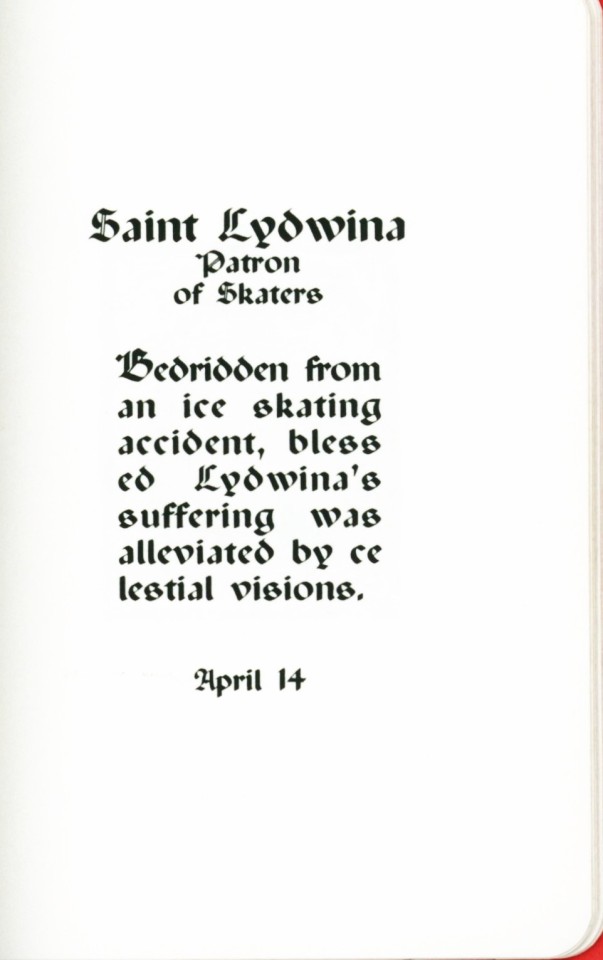
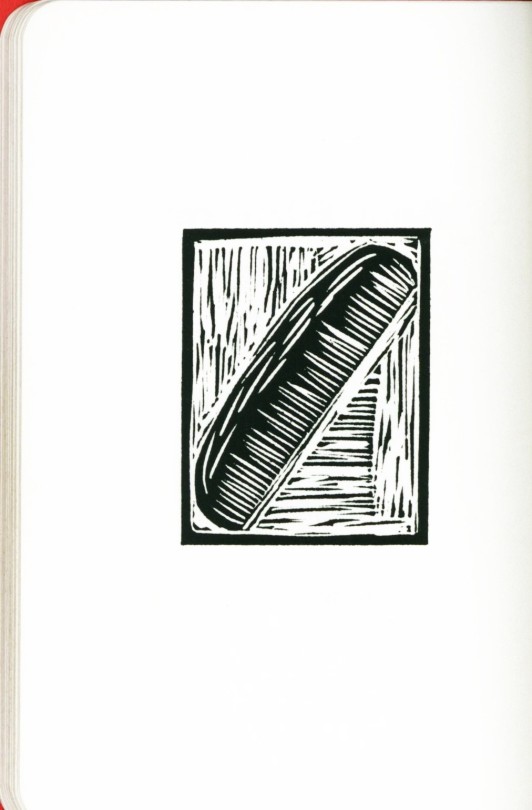
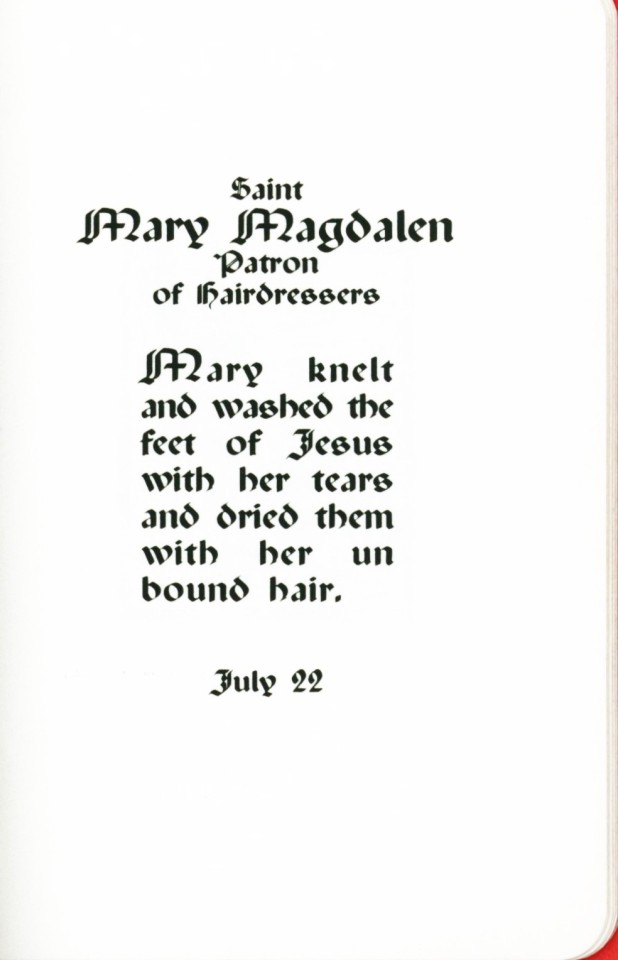
When choosing saints to include in this book, Krueger picked saints that he could pair with a particular garment of clothing or items associated with getting dressed, and these pairings are included in a catalogue on the last page of the book. While the patron saint of students (Thomas Aquinas) is not included within these pages, you are still sure to find someone to help you out in the pages of this short book!
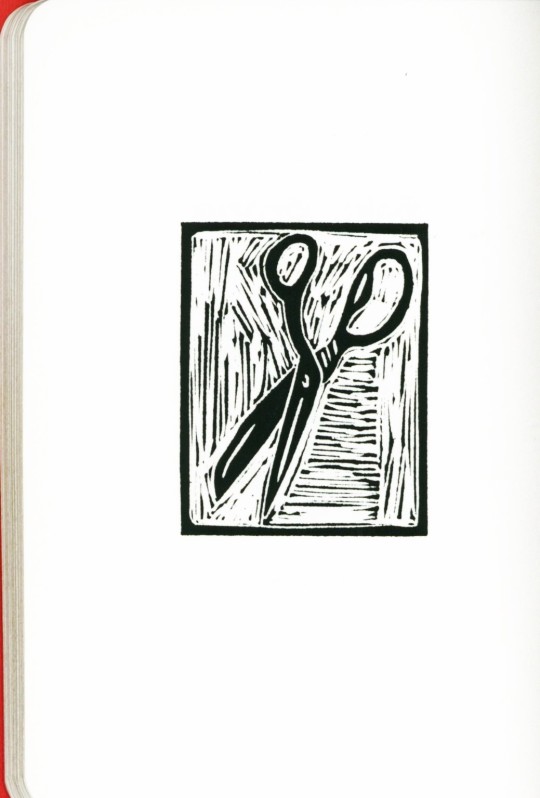
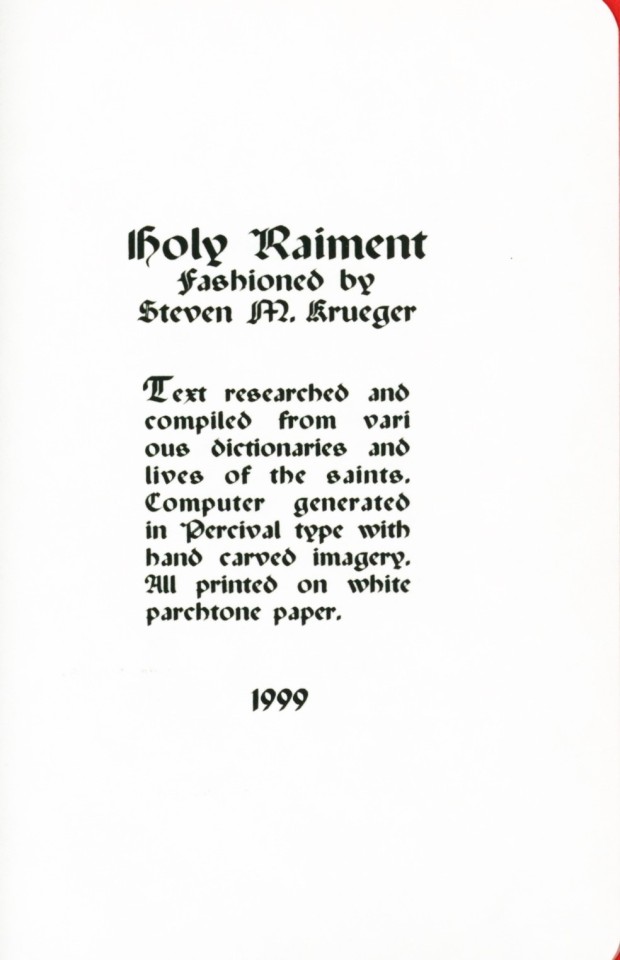
The text was compiled from various books about the lives of the saints, the text is computer-generated in Percival type, and the type and engravings are printed on white Parchtone paper.
View more staff picks.
– Sarah S., Special Collections Graduate Intern
#Staff Pick of the Week#staff picks#Steven M. Krueger#holy raiment#saints#patron saints#clothes#clothing#catholic#catholicism#relief prints#rubber stamp#Sarah S.
20 notes
·
View notes
Text
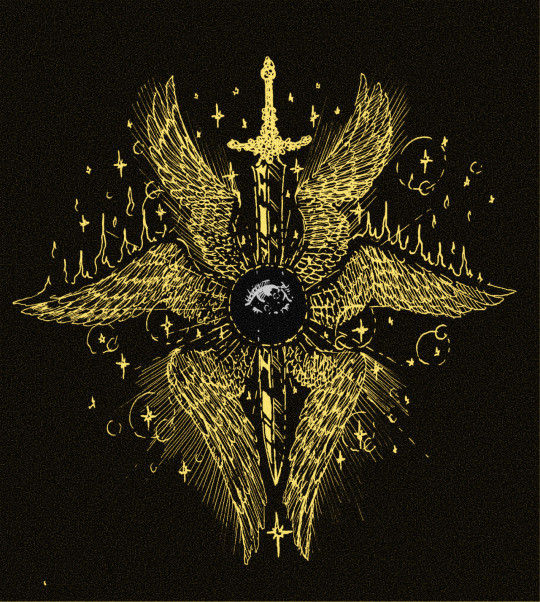
“Holy, holy, holy.”
The Beauty of the Seraphim
“The Seraphim are all eyes — they can perceive true beauty.”
I believe this is a quote from Kathleen Norris; however, don’t quote me on that. In any event, it is a curious and fascinating statement.
The seraphim are the highest order of angels in the pseudo-Dionysian hierarchic scheme, and in the Jewish tradition, also. They surround the throne of Glory and utter the Trisagion incessantly: “Holy, holy, holy.”
According to one tradition, they are the angels of love, and light, and of fire. III Enoch states that their number is limited to 4: “corresponding to the 4 winds of the world.” And in Enoch II they are described as having four faces and six wings, as in Isaiah chapter 6.
Some scholars maintain that the only Old Testament reference to the seraphim is in Isaiah 6. Although others assert that Numbers 21:6, the “fiery serpents,” could refer to the seraphim. And ostensibly, they are not even directly referred to in the New Testament autograph, except perhaps obliquely in Rev. 4:8.
Their prince has been named variously as Seraphiel, Jehoel, Metatron, Michael, and Satan himself, before he fell, of course. However, that cannot be, as Satan is described as a mere cherub, that is, having only four wings.
By some, the seraphim are equated with the ophanim, which may be rendered either ‘wheels,’ or ‘many-eyed ones.’ And since they are all eyes, they can perceive true beauty. At least, that’s what is implied. Is this true? And to what do the “eyes” refer?
The reference to the “eyes” of the seraphim is found in Revelation 4:8, which reads: “And the four Zoa had each of them respectively, six wings; around and within they are full of eyes.”
And there is another oblique reference to the “eyes” in Ezekiel 1:18: “Their rims were high and awesome, and all four rims were full of eyes all around.” And it must be noted, that the “eyes” in this passage appear to be within the wheels of the Chariot of Adonai; so this may not refer to the seraphim at all.
Very few commentators will discuss the “eyes” of Revelation 4:8. So let’s look at the angelic hierarchy: the First, and the foremost, is Adonai eloheinu as the commander in chief of all the angelic armies. The next level down in the hierarchy is composed of the archangels who command individual armies. And from there, to the General Staff, who make the angelic army function. And they worship, too.
Ah, worship! To know and understand how to worship.
The KJV puts it this way: “And round about the throne were four and twenty seats; and upon the seats, I saw four and twenty elders sitting, clothed in white raiment, and they had on their heads crowns of gold.” Rev. 4:6
‘And’ is the conjunctive use of the conjunction kai, which means ’also.’ And with it, is the adverb of place, kuklothen; and it is used as an improper preposition with the noun thronos: “also around the throne.” The ellipsis demands the repetition of the verb ‘I saw,’ be inserted; and the direct object is composed of three words, all of which are the objects of the verb. “And around the throne I saw….” Eikosai, twenty; and with it the accusative of tessares: twenty-four additional thrones. And these thrones are reserved for the angelic general staff.
These angels have authority in the heavens during the periods of the Church Age, the Tribulation and the Millennium. These angels have achieved great status — wisdom of a spiritual type.
From this, perhaps, another form of beauty is organization. For organization allows the efficient use of many elements: time, space, money, materiel, etc. Organization relieves pressure and stress. And these twenty-four angelic staff officers are well organized. Their job is to apply correct information and data to any situation.
“And upon the thrones…” then the present passive participle of kathemai: they were sitting. And people who sit, think. Correct action must be supported by thought. Thus, these twenty-four angels are thinking, not doing. Indeed, they are just being. They know they are loved. They realize and acknowledge Who and What God is. They acknowledge pure, radical Love as beauty nonpareil.
--Randall Radic Aug 21, 2023
14 notes
·
View notes
Text
Could this character be a god?
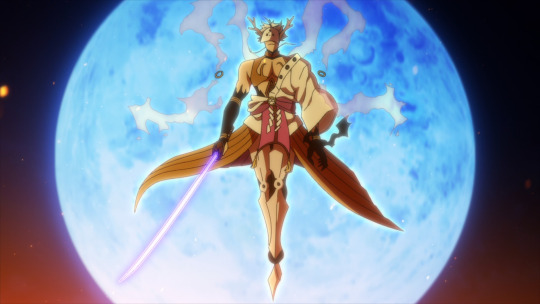
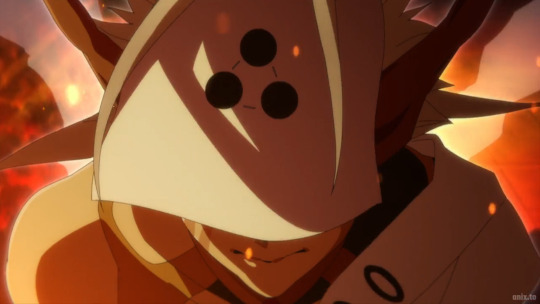
Magical Floating Shawl (hagoromo)
In Japanese media, the raiment is called hagoromo (translated to "feather robe"), or tenne, and is usually worn by supernatural beings, such as youkai, demons, gods, ascended humans, angels, etc. (source)

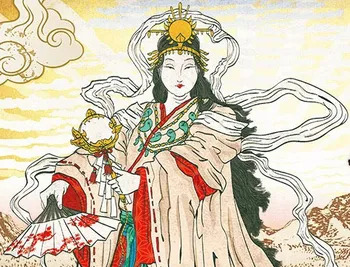
Left: Fūjin, the wind god. Right: Amaterasu, goddess of the sun.
Antlers and Horns in Japanese Folklore
Kirin:
The kirin is one of the rarest, most awesome and powerful creatures ever known in East Asia. It is a regal animal, holy and highly revered. The kirin is often considered a god in its own right. Resembling a deer with scales like a dragon’s covering its body, the kirin is a chimerical beast. (source)
Sacred Deer:
"In Japan, Jurōjin (寿老人) is one of the Seven Gods of Fortune or Shichifukujin, according to Taoist beliefs. He is the god of longevity. ... The deer, a symbol of longevity, usually (but not always) accompanies him as a messenger..." (source)
"Deer are considered messengers to the gods in Shinto, especially Kasuga Shrine in Nara Prefecture where a white deer had arrived from Kashima Shrine as its divine messenger." (source)
Horned Gods and Yokai: various strong gods and yokai in Japanese mythology are depicted with horns.
"Raijin, the god of thunder, is often depicted with a unique appearance. He is shown as having a muscular and fierce build, with horns on his head and sharp claws." (source)
"Fujin, the god of wind ... is represented as a muscular demon with a horned red face and a fierce expression." (source)
"The Oni, a more threatening group of spirits, may have originated in China and traveled to Japan with Buddhism. These horned demons, often of enormous size, can take human or animal shape." (source)
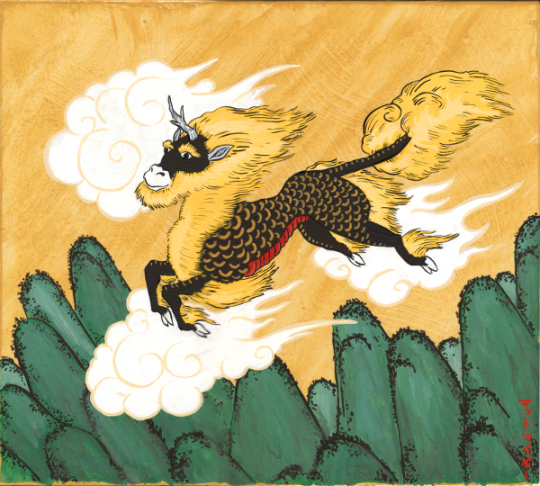
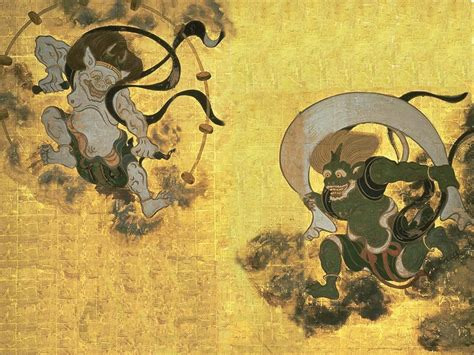
Left: Kirin. Right: Raijin and Fujin fighting.
Masks
"Masks have been used in Japan for centuries, with their usage dating back to at least the 6th century. Traditionally, masks were used in religious ceremonies or rituals, as well as for protection from evil spirits. In more recent times, masks have been used for a variety of purposes, including as part of traditional Japanese theater, in festivals and carnivals, and even as everyday fashion accessories." (source)
In the manga series Natsume Yuujinchou, masks are worn when the protagonist, Natsume, needs to hide the fact he is a human and blend in with the yokai, spirits, and gods he encounters. Many of the masks and disguises he wears incorporate antlers and horns as well.

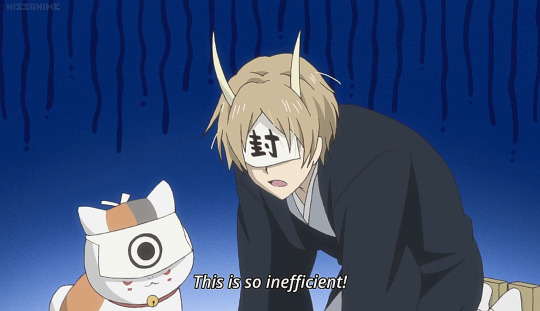
Shide
"Shide (紙垂, 四手) are zigzag-shaped paper streamers, often seen attached to shimenawa or tamagushi to demarcate holy spaces, and used in Shinto rituals in Japan. They are usually found adorning doorways, shrine buildings, and kamidana." (source)


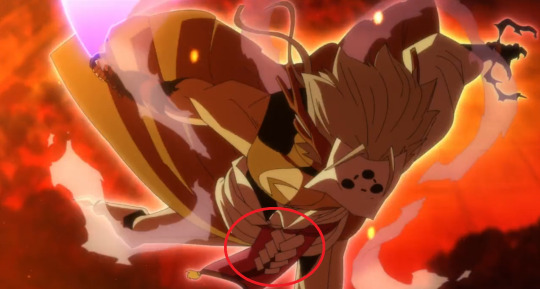
Tori Gates
"A torii is a traditional Japanese gate most commonly found at the entrance of or within a Shinto shrine, where it symbolically marks the transition from the mundane to the sacred and a spot where kami are welcomed and thought to travel through. The presence of a torii at the entrance is usually the simplest way to identify Shinto shrines, and a small torii icon represents them on Japanese road maps." (source)


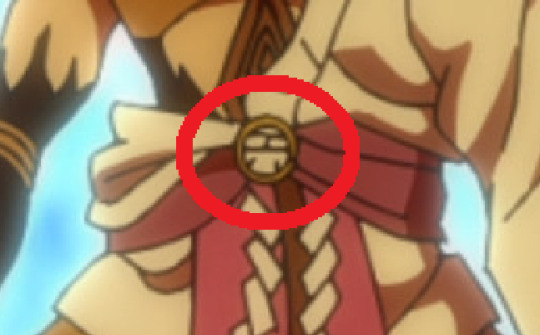
Shinto Symbols
I'm not sure what symbol is on the character's mask, but because there are so many Shinto influences in his design I am assuming the symbol has a similar origin. The closest symbol I was able to find is called a Tomoe.
"The Tomoe is a design that resembles a comma, and is a common design element in Kamon, Japanese family crests, that could be viewed upon the back banners often held by Samurai. This specific Tomoe is called a Mitsudomoe, a three-fold Tomoe, and is perhaps one of the most widely recognisable. Some believe it to be the representation of the threefold division (man, earth and sky) at the heart of Shintoism..." (source)
Below is a chart with variations of the Tomoe symbol:
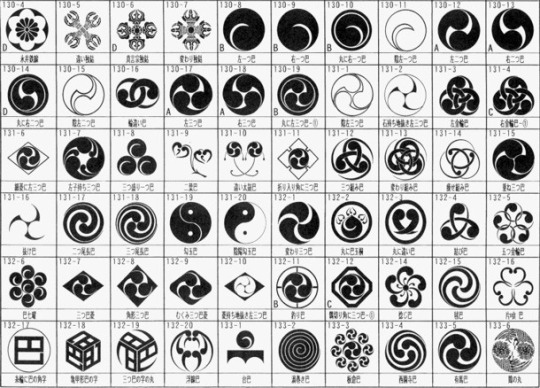
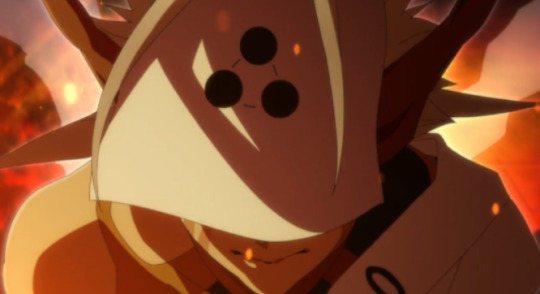
#bungo stray dogs#bungou stray dogs#bsd#season 5#spoilers#fan theory#shinto symbols#I also just figured out that Mishima Yukio was a Shintoist#which only makes me hope that Sigma is the god character who is Mishima Yukio#but it is probably all just me reading into things too much and my wishful thinking
47 notes
·
View notes
Text

❝ "Does my brother – your husband – know that you still desire me?"
"Unlike you, he is pure and good and so very agreeable. Unlike you, he knows when to obey." ❞
⊱ Prompt: BDSM, painal
⊱ Pairing: Varda x Melkor
⊱ Synopsis: After Melkor has been captured, Varda decides to try her hand at making him submit to his rightful queen - and doing it her own way.
⊱ Featuring: Eldritch Ainur, tentacles made of holy light, sadistic domme Varda, double/triple penetration (spicy bingo)
⊱ Warnings: Non-con, non-consensual BDSM, infidelity*, Varda's holy light hurts Melkor, the painal prompt in itself
*I personally hc that Ainur couples tend to be quite liberal with physical love (as their bodies are just raiment to them), however Varda is doing this behind Manwë's back and he might not be ok with his wife assaulting his brother, so... make of it what you will, warning just to be safe.
𝑨𝒖𝒕𝒉𝒐𝒓'𝒔 𝑵𝒐𝒕𝒆: Another one for @tolkienpinupcalendar's Dead Dove December that I'm still writing in February because yes. Enjoy~

It had pleased her to see him in chains.
And it pleased her even more to have him kneel in front of her.
Varda had ordered Melkor to be brought to her observatory within the highest tower of Ilmarin. Whether it was to settle an ancient dispute or it was merely pleasure she sought she herself couldn't tell, but what she knew for certain was that she finally had the arrogant Vala all to herself, away from the gaze of her sweet, all too kind husband.
Though, of course, said Vala wouldn't make it easy to teach him a lesson in humility.
Melkor looked up at her, a dark, triumphant grin twisting his fair features, and Varda swore to herself that she would wipe it off his face.
"So you wanted me all along, hm?"
"The only thing I could ever want of you is your complete and utter surrender and submission to my rule," she said coldly and gripped his jaw.
The searing heat of her hallowed hand elicited a sharp hiss of pain from the Dark Vala, and it was Varda's turn to smile.
Even so, Melkor remained defiant. "Does my brother – your husband – know that you still desire me?"
"Unlike you, he is pure and good and so very agreeable. Unlike you, he knows when to obey."
"True." His attempt at regaining his haughty smile was more akin to a beast baring its teeth, but Varda was undaunted; rather, she felt a surge of excitement.
One brother, already tame within her capable hands, and the other to be tamed by her, so that he might never challenge her or her subjects again.
Melkor took advantage of her pensive silence. "But you are wrong if you believe I will be your little pet like he is – as amusing as it would be to see you admitting how much you have wanted me this whole time. Really, Varda, the true Elder King and Eru's impostor? How greedy of you."
Without warning, Varda slapped him.
"You shall not insult me or my husband in my presence. And whether you will learn to submit or not, we shall see."
She could sense that it was slowly dawning on him how serious she was, and she wondered how Melkor would look if he was terrified, how he would sound if his mighty voice was reduced to a pleading whimper – something she quite enjoyed doing to Manwë.
Fascinated, Varda looked at the handprint she had left on the Dark Vala's cheek, then her own hand, still faintly glowing with furious starlight, and finally at his bound form. He was trapped in his flesh in more ways than one thanks to Angainor, and the sensation of pain seemed more acute and intimate than what she had observed with other Ainur.
Light, too, had served Melkor once, yet now its holy purity hurt him – retribution for his crimes – and it obeyed her command rather than his; and it was then that she knew exactly how she would teach him a lesson.
With an elegant flick of her wrist, Varda sent forth a wave of starfire that incinerated the tattered remains of his clothes, leaving him bare under her merciless gaze.
Fallen or not, he was still a sight to behold. Where Manwë's form spoke of lithe grace, Melkor's contained raw strength; where Manwë's hands were made for shaping clouds, holding quills to write his poetry and gentle touch, Melkor's carved valleys, broke mountains and accomplished many other evil deeds and feats of destruction.
Varda allowed herself to behold his naked fána a while longer, until she found her eyes once again lingering on the mark she had left, marring skin that was cool, smooth and pale like snow.
The temptation to touch him was great, but he was unworthy of such pleasure.
Instead she gripped the collar Tulkas had so kindly put around his neck and forced him down on all fours with his head bowed in supplication. Melkor attempted to fight back, but Angainor sapped his strength and her light threatened to blind and burn him once more, so he acquiesced, though most unwillingly; his pride, as always, remained strong.
Not for long, Varda promised herself, then asked aloud, "Will you be good for me?"
"You should know better than to ask," Melkor snapped.
"Very well." As far as she was concerned, his fate was sealed.
Light erupted from her chest, back and shoulders, swiftly coalescing into long, tendril-like limbs – reminiscent of Yavanna's vines or even the tentacles of Ulmo's sea creatures, Varda thought with idle amusement. One wrapped around Melkor's neck, others pressed down on the back of his head and his shoulder blades to keep him down, more reached for his legs, while she calmly walked out of his sight and stood behind him, eager to witness the punishment she would bestow on him for his wicked ways.
"You wouldn't," was all Melkor managed to say, though his voice shook just enough for Varda to know he was uncertain.
"It doesn't have to happen," she said. "Renounce your false claim to kingship, call me your queen and abjure your evil deeds. Otherwise... yes, I would, and I will."
"Never!"
Knowing that he couldn't see the delighted smile on her face, Varda allowed herself to indulge in her darkest impulses.
"I knew you would say that."
Hidden within the folds of her luxurious dress was, as always, a phial with water from her beloved wells that she now gleefully poured over his exposed backside, revelling in his vulnerability. The hallowed liquid was enough to make Melkor shiver in discomfort, and Varda knew full well it wouldn't provide sufficient lubrication either, but such was also not her intention.
She wanted to purify and cause pain.
And when she felt hot, tight flesh desperately clenching around one of her additional appendages and heard Melkor's scream within his ëala even before the sound tore through the air, she knew she had succeeded. Varda took her time pushing deeper and deeper, both curious to find the limits of his fána and aroused by the sight and sensation of penetrating the rebellious Vala that had caused her endless frustration. There was a certain pleasure to be found in breaking resistance, she noted, one that she couldn't derive from her sweet and docile husband.
To her own surprise, Varda felt laughter bubbling up inside her chest.
"You have your uses after all. Perhaps I was wrong to dismiss you as a lover," she taunted. "Though..."
Willing a smaller tendril to wrap around the base of Melkor's cock, she drank in the panicked cry that followed with haughty indifference.
"... make no mistake, this is not for pleasure."
Yet Varda was lying to him, and she knew it as soon as she said those words. While she wouldn't allow Melkor to enjoy any of this, she would very much take pleasure in it herself. His screams and sobs whenever her light came in contact with his unholy flesh and moved inside him were bliss to her ears, even with the discord tainting his once-beautiful voice, and the desire to touch herself became unbearable when a second appendage joined the first, painfully penetrating her now-subdued nemesis.
Varda slipped one hand under her dress to take care of herself – even serving her pleasure would be too high of an honour for Melkor – and waited. If necessary she would burn every inch of his skin and tear his hole open with more and more limbs of all shapes and sizes, but in the end she would have him begging for mercy.
No sooner than that would she grant it.
She commanded a third appendage to enter her helpless prisoner, stretching the delicate ring of muscle to its limit, and soon felt something wet staining her luminous limbs, droplets of black blood. The sharp scent of iron assaulted her senses, and Varda knew not whether to be disgusted or excited.
And for all his strength, Melkor was both captive and slave to his own flesh, and his will was swiftly eroded by blinding hot pain, causing him to break.
"Stop it, please – please! I..."
"Yes?" Varda stilled inside him, yet her fána was shuddering with pleasure. Her hand moved faster now, almost erratically.
She was close and so was he in a way, though they arrived at wholly different limits.
"Please... my queen..."
Melkor was in a pitiful state, Varda noticed even as lust clouded her mind. Crying, sobbing, nearly collapsing on the floor from the pain he was in; a prideful being reduced to beautiful submission. It was this thought, this raw feeling of triumph and dominance that pushed her over the edge, and she took her time basking in the warm glow of her orgasm before pulling out and letting go of his neck.
Black marks remained where her tendrils of light had restrained Melkor's fána and his hole was loose and raw as if he had been taken by the entire Valarin council. The mental image elicited a small chuckle from Varda; if he misbehaved again, she might consider doing exactly that and sharing him with the others.
Nienna, of course, would tell her to pity him and Manwë would ask for mercy on behalf of his brother, but she found that she quite enjoyed the view and felt no regret.
"You wanted me once and now you are whimpering and crying at my feet. Isn't this what you wanted? Does the light no longer please you, dear?”

Thanks for reading! ♡
#⊰✦⊱ non-con#melkor#morgoth#varda#varda elentari#elbereth#valar#ainur#silm smut#minors dni#silm fanfic#silmarillion fanfiction#silmarillion#cílil writes#my writing#tw noncon#cw noncon#dead dove do not eat#TPCdeaddovedecember
15 notes
·
View notes
Text
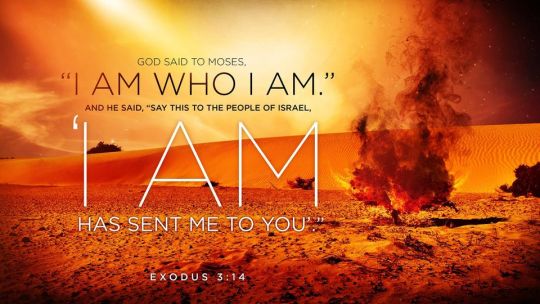
Exodus 3
1 Now Moses kept the flock of Jethro his father in law, the priest of Midian: and he led the flock to the backside of the desert, and came to the mountain of God, even to Horeb.
2 And the angel of the Lord appeared unto him in a flame of fire out of the midst of a bush: and he looked, and, behold, the bush burned with fire, and the bush was not consumed.
3 And Moses said, I will now turn aside, and see this great sight, why the bush is not burnt.
4 And when the Lord saw that he turned aside to see, God called unto him out of the midst of the bush, and said, Moses, Moses. And he said, Here am I.
5 And he said, Draw not nigh hither: put off thy shoes from off thy feet, for the place whereon thou standest is holy ground.
6 Moreover he said, I am the God of thy father, the God of Abraham, the God of Isaac, and the God of Jacob. And Moses hid his face; for he was afraid to look upon God.
7 And the Lord said, I have surely seen the affliction of my people which are in Egypt, and have heard their cry by reason of their taskmasters; for I know their sorrows;
8 And I am come down to deliver them out of the hand of the Egyptians, and to bring them up out of that land unto a good land and a large, unto a land flowing with milk and honey; unto the place of the Canaanites, and the Hittites, and the Amorites, and the Perizzites, and the Hivites, and the Jebusites.
9 Now therefore, behold, the cry of the children of Israel is come unto me: and I have also seen the oppression wherewith the Egyptians oppress them.
10 Come now therefore, and I will send thee unto Pharaoh, that thou mayest bring forth my people the children of Israel out of Egypt.
11 And Moses said unto God, Who am I, that I should go unto Pharaoh, and that I should bring forth the children of Israel out of Egypt?
12 And he said, Certainly I will be with thee; and this shall be a token unto thee, that I have sent thee: When thou hast brought forth the people out of Egypt, ye shall serve God upon this mountain.
13 And Moses said unto God, Behold, when I come unto the children of Israel, and shall say unto them, The God of your fathers hath sent me unto you; and they shall say to me, What is his name? what shall I say unto them?
14 And God said unto Moses, I Am That I Am: and he said, Thus shalt thou say unto the children of Israel, I Am hath sent me unto you.
15 And God said moreover unto Moses, Thus shalt thou say unto the children of Israel, the Lord God of your fathers, the God of Abraham, the God of Isaac, and the God of Jacob, hath sent me unto you: this is my name for ever, and this is my memorial unto all generations.
16 Go, and gather the elders of Israel together, and say unto them, The Lord God of your fathers, the God of Abraham, of Isaac, and of Jacob, appeared unto me, saying, I have surely visited you, and seen that which is done to you in Egypt:
17 And I have said, I will bring you up out of the affliction of Egypt unto the land of the Canaanites, and the Hittites, and the Amorites, and the Perizzites, and the Hivites, and the Jebusites, unto a land flowing with milk and honey.
18 And they shall hearken to thy voice: and thou shalt come, thou and the elders of Israel, unto the king of Egypt, and ye shall say unto him, The Lord God of the Hebrews hath met with us: and now let us go, we beseech thee, three days' journey into the wilderness, that we may sacrifice to the Lord our God.
19 And I am sure that the king of Egypt will not let you go, no, not by a mighty hand.
20 And I will stretch out my hand, and smite Egypt with all my wonders which I will do in the midst thereof: and after that he will let you go.
21 And I will give this people favour in the sight of the Egyptians: and it shall come to pass, that, when ye go, ye shall not go empty.
22 But every woman shall borrow of her neighbour, and of her that sojourneth in her house, jewels of silver, and jewels of gold, and raiment: and ye shall put them upon your sons, and upon your daughters; and ye shall spoil the Egyptians.
8 notes
·
View notes
Text
"The proper sphere of woman we hold to be in no way inferior to that of man. That sphere is of the highest. As wife and mother she is queen of the most holy aspirations. When she moves in her own proper orbit she fulfills her true duties as a citizen; and while men are struggling with the battle of life for food and raiment she cares for the progeny—the future men and women of the country. Who shall guard our children when women seek the polls, and amid the haunts of men wear themselves and their better thoughts away? For the many unmarried women and widows who have to meet the struggle of life and toil for themselves we are especially solicitous."
-Madeleine V. Dahlgren
From Thoughts on Female Suffrage and in Vindication of Woman's True Rights, 1871
47 notes
·
View notes
Text
SAINT OF THE DAY (March 22)
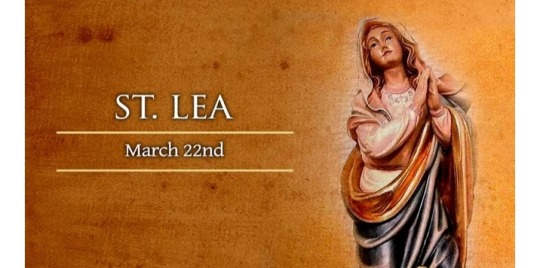
March 22 is the liturgical memorial of Saint Lea of Rome, a fourth-century widow who left her wealth behind, entered consecrated life, and attained great holiness through asceticism and prayer.
Though not well-known as a figure of devotion in modern times, she was acknowledged as a saint on the testimony of her contemporary Saint Jerome, who wrote a brief description of Lea's life after she had died.
Jerome, a scholarly monk best known for his Latin translation of the Bible (the Vulgate), is the Church's only source of information on St. Lea, whose biographical details are unknown.
St. Jerome eulogized her in a letter written during the year 384 to his student and spiritual directee Marcella, another Roman consecrated woman who had left her aristocratic life behind after being widowed.
It is clear from his letter that Lea was a mutual friend to both Jerome and Marcella.
Jerome states that his account is written to “hail with joy the release of a soul, which has trampled Satan under foot, and won for itself, at last, a crown of tranquility.”
Jerome also contrasts the life of “our most saintly friend” with that of the late pagan public official, Praetextatus, held up by Jerome as a cautionary example.
“Who,” Jerome begins, “can sufficiently eulogize our dear Lea's mode of living? So complete was her conversion to the Lord that, becoming the head of a monastery, she showed herself a true mother to the virgins in it, wore coarse sackcloth instead of soft raiment, passed sleepless nights in prayer, and instructed her companions even more by example than by precept.”
Jerome describes how Lea, in her great humility, “was accounted the servant of all … She was careless of her dress, neglected her hair, and ate only the coarsest food. Still, in all that she did, she avoided ostentation that she might not have her reward in this world.”
Jerome's letter goes on to compare her fate to that of Praetextus – who died in the same year as Lea, after spending his life promoting a return to Rome's ancient polytheistic pagan religion.
The monk retells Jesus' parable of Lazarus and Dives, with Lea in the place of the poor and suffering man.
Lea, Jerome says, is “welcomed into the choirs of the angels; she is comforted in Abraham's bosom.
And, as once the beggar Lazarus saw the rich man, for all his purple, lying in torment, so does Lea see the consul, not now in his triumphal robe but clothed in mourning, and asking for a drop of water from her little finger.”
Thus Lea, “who seemed poor and of little worth, and whose life was accounted madness,” triumphs in salvation.
But the punishment of infidelity falls on the consul-elect — who had led a triumphant procession just before his death and had been widely mourned afterward.
Jerome ends his letter by urging Marcella to remember the lesson of St. Lea's life:
“We must not allow … money to weigh us down, or lean upon the staff of worldly power. We must not seek to possess both Christ and the world.
No; things eternal must take the place of things transitory; and since, physically speaking, we daily anticipate death, if we wish for immortality we must realize that we are but mortal.”
6 notes
·
View notes
Text
one of my most This-Would-Probably-Annoy-Tolkien-Deeply opinions about tolkien's work is that gender is so extremely and Visibly constructed in his little universe---what with all the gods being genderless until they descend into materiality and choose a presentation that suits them---that it's very conceivable that any and all characters in all his stories are also trans bc, as evident with the rest of his work's thematic content, the world mimics the song of the divine, thus all creatures have the same sort of freedom of expression as the holy beings who sang the world into existence.
obviously, there's variety throughout the scope of middle-earth. rohan as a good example of a place weirdly stringent about gender roles (makes sense, given that it's very much just england pre-1066).
it also works in terms of his conception of Evil being the supremely Un-creative. sauron's evil mind is evil bc he can only corrupt, not make, and he is "un-natural" and cannot even shift his earthly raiment, like other holy ones. he is construction without proper deference to truth and life. there is no "crossing" for him, no journey or growth or renewal.
also also, tolkien gave female dwarves beards.
160 notes
·
View notes
Text
The Reckoning of Rivendell puts Yestarë, the first day of Spring and the Elven new year, somewhere around April 6.
So first off, happy Yestarë!
And second, here's In These Holy Waters once again to mark the occasion:

Finrod’s dive cut through the surface, hardly leaving a splash as he slipped beneath Ivrin’s mere. The water was ice, as ever in these first days of spring when the falls roared down from the heights, filling the basin with snowmelt from the shoulders of the Ered Wethrin. It was a cleansing draught that woke the long slumber, winter shearing away through the glass and light.
Once, any cold plunge had borne his thought back to Yestarë and this yearly pilgrimage to Ulmo’s Well. But as he glided through the current, it was the waters of Ivrin shifting into a remembrance of that other reverence—Celon, with his wide, easy movement; Celon with his ice and his burning knowledge.
Finrod drew his mind back with an effort. He was in Ivrin’s lake, fed by the holy well, the current alive with the presence of the Lord of Waters, the brilliance encircling him. He was home.
Balan had told him once, when their dead were buried on the road from Ossiriand, of his own people’s tradition—the world had been formed from the goddess of earth, from the god of water. Each poured themselves throughout its making and each, therefore, was bound till the end of time within the rock and earth, the ice and rivers. No forms did they reveal beyond these elements, for none could they take on without drawing their sustenance out from the world. Thus through the ceremonial washing, the fallen were wrapped in Guënid’s embrace. In burial, they returned to the arms of Melishk.
So it was here, Finrod thought as he surfaced and the air refilled his lungs. The Sea would not have him, Ossë would rage if ever he drew boat from shore, Uinen would turn her face aside. The Valar no longer walked beside them in raiment of flesh, but here in these holy waters he was held again as in the sea-brine of Belegaer, and his heart sang in exultation with the hymns of his mother’s people. The melody spilled out from his lips, bright as the shimmering water, and as its echoes rippled over him from the surrounding stone, he plunged once more beneath the surface.
There through the water he felt the others suspended too within that chorus. Canneth and Lithui, Edrahil’s dive twisting round in a great loop, weightless. Sídhon wading carefully from the shore and young Gwindor hurled laughing from his brother’s arms. Gildor—dear, beloved boy—soaring through the water with abandon, hands outstretched and grasping after some elusive kinship with his father’s heritage. Each of them woven through the waves, each wrapped in Ulmo’s embrace...
[Keep reading on AO3]

6 notes
·
View notes
Note
Lets just boost Arien up a bit
Arien's really similar to or had some connection with Laurelin. Also had a good sense with Morgoth.
[...she was chosen because she had not feared the heats of Laurelin, and was unhurt by them, being from the beginning a spirit of fire, whom Melkor had not deceived nor drawn to his service.
With her being a spirit of fire she could burn twice as bright with the treelight
Too bright were the eyes of Arien for even the Eldar to look on
The book never explicitly went into how the literal appearance of the sun relates to the fruit, but it might have something to do with her shedding her body.
[...and leaving Valinor she forsook the form and raiment which like the Valar she had worn there, and she was as a naked flame, terrible in the fullness of her splendour.
She stripped, she's monstrously naked. Morgoth and his people can't stand her so much that they hide in the shadows, shielding themselves with smoke and clouds.
With shadows he hid himself and his servants from Arien, the glance of whose eyes they could not long endure; and the lands near his dwelling were shrouded in fumes and great clouds.
In BOLT there was a basin made to hold the dew of Laurelin's fruit. There was nervousness around the liquid light because Valar’s bodies seemingly can't endure it long. This is said by Manwe.
[...for even the holy bodies of the Valar, meseems, may not for long endure to bathe in this great light.
But this older Arien/Urwendi with her maidens went, bathed in it, and their bodies were transformed.
Then did she bade as many of her maidens to follow her [...] and casting aside their raiment they went down into that pool Faskalan as bathers into the sea, and its golden foams went over their bodies and the Gods saw them not and were afraid. But after a while they came again to the brazen shores and were not as before, for their bodies were grown lucent and shone as with an ardour within, and light flashed from their limbs as they moved.
She’s wonderful even in the rejects.
lovely thank you!
25 notes
·
View notes
Text
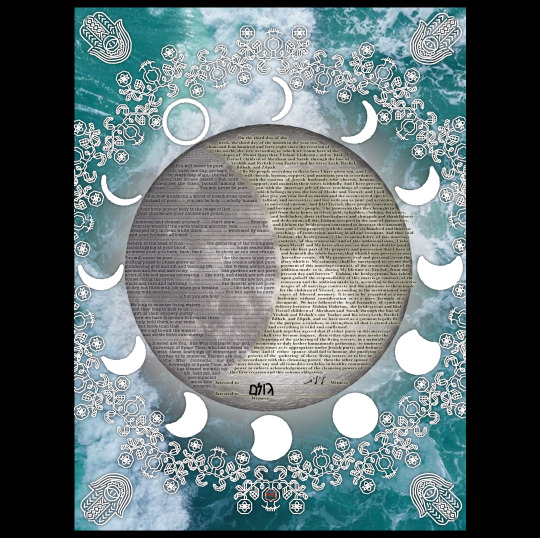
This week's mikveh art: I rewrote the traditional ketubah wording with the Lieberman clause to be between Klal Yisrael and the divine, and rewrote the Lieberman clause as a purification clause. Mimicking the vernacular and Hebrew ketubot style, I added in a poem and my poetic translation of the traditional immersion and shehecheyanu brachot to the left.
I am fascinated by the delineation between purity and holiness, and the fact no-one can be purified, technically, until a Temple is rebuilt. This opens so many possibilities for us!
Since technically all humans are related to humanity and thus ineligible to sign as witnesses, I had Lilith and a golem (I like to think it's the Golem of Prague) sign. I struggled to choose which name of Gd to write in (I collect them, all with shades of meaning) but settled on an ungendered or god-gendered version. In some places you will see the word 'god' or 'godself;' I use god as Elohim's pronouns. Since the month starts with the fresh crescent moon, and it's my name, I centered that at the top of the phases. The papercut is traced off a pomegranate blackwork pattern.
Text on image below image description.
Image description: a ketubah with a background of bright blue and white waves, centered on a photo of the moon. The moon has a white glow. White hamsot in the corners, white pomegranate blackwork in a circle, and white moon phases starting with a rosh chodesh moon at center top circling the moon and text in center mimic papercutting. The ketubah text on right of the moon has a yellow cast to black font and is shaped like a crescent. The remaining space to left is a poem with a purple gray cast. The ketubah is signed in thin cursive Hebrew by Lilith, and childishly large block print Hebrew by the golem. The bottom centered pomegranate holds the artist's signature in red.
~~~
Ketubah text:
On the third day of the week, the third day of the month in the year two thousand four hundred and forty eight since the creation of the world, the era according to which we count here at the slopes of Mount Sinai that Elohim Eloheinu said to Klal Yisrael children of Abraham and Sarah through the line of Yitzhak and Rivkah’s son Yaakov and his wives Leah, Rachel, Bilhah, and Zilpah.
“Be My people according to these laws I have given you, and I will cherish, honour, support, and maintain you in accordance with the custom of Jewish husbands who cherish, honour, support, and maintain their wives faithfully. And I here present you with the marriage gift of these teachings of connection, which belongs to you, the law of Moshe and Yisrael; and I will also give you your food as manna and the seven sacred species, tallitot, and necessities, and live with you as your god according to universal custom. And Klal Yisrael, these people consented and became god’s people. The trousseau that they brought to god from their house in silver, gold, valuables, clothing, furniture, and bedclothes, their stiffneckedness and chutzpah and thankfulness and dedication, all this Elohim accepted in the sum of themselves, and Elohim the bridegroom consented to increase this amount from god’s own property with the sum of six hundred and thirteen teachings of connection, making in all one covenant. And thus said Elohim, the bridegroom: “The responsibility of this marriage contract, of this trousseau, and of this additional sum, I take upon Myself and My heirs after me, so that they shall be paid from the best part of My property and possession that I have of and beneath the whole heaven, that which I now possess or may hereafter create. All My property, real and personal, even the glory which is My raiment, shall be mortgaged to secure the payment of this marriage contract, of the trousseau, and of the addition made to it, during My lifetime as Ein Sof, from the present day and forever.” Elohim, the bridgegroom, has taken upon godself the responsibility of this marriage contract, of the trousseau and the addition made to it, according to the restrictive usages of all marriage contracts and the additions to them made for the children of Yisrael, according to the institution of our sages of blessed memory. It is not to be regarded as a mere forfeiture without consideration or as a mere formula of a document. We have followed the legal formality of symbolic delivery between Elohim Eloheinu, the bridegroom and Klal Yisrael children of Abraham and Sarah through the line of Yitzhak and Rivkah’s son Yaakov and his wives Leah, Rachel, Bilhah, and Zilpah, and we have used as a garment legally fit for the purpose a rainbow, to strengthen all that is stated above, and everything is valid and confirmed.
And both together agreed that if either party in this marriage shall ever become impure, then either spouse may invoke the cleansing of the gathering of the living waters, in a naturally occurring or duly kosher humanmade gathering, to immerse three times as is appropriate under Jewish purity and holiness law; and if either spouse shall fail to honour the purifying powers of the gathering of these living waters or to live in accordance with this cleansing power, then the other spouse may invoke any and all remedies available in healthy community power to enforce acknowledgement of the cleansing powers of this first creation and this solemn abligation.
Attested to [Lilith] Witness
Attested to [GOLEM] Witness
~~~
Poetry text: Note that in order for a ketubah to be kosher, there must be a clearly defined shape to the text with no space to alter the contract. This text is not exactly what appears on the image so as to make it screen reader friendly. All open space has been replaced with words in a font half the size to fill it. These are bracketed so you know what words are repeated to fill the space. They exist between stanzas and in stanzas separating the lines.
[purity holiness]
You will never be pure.
Oh, sure, one day, perhaps,
the stars may align,
the calf be born,
the stones relaid -
but until then
see the foxes, jackals, among the ruins.
You will never be pure.
[purity wholeness]
But how wonderful a world of possibilities opens!
Instead of pure
you can be holy
wholly human.
[wholeness purity]
Your body is your body is the image of God.
your choices are your choices are yours.
[purity holiness]
Immerse, and cleanse yourself.
Start anew.
Emerge from the womb of the earth
trailing amniotic rain.
Be wrapped dry in clean white linen,
welcomed by name,
and your holiness affirmed.
[immerse]
Return to the head of it all:
the gathering of the roiling sea,
moon tugging at your blood,
lungs sealed shut,
as waves push you back, back, back
to shore as sun sets orange.
[purify immerse]
You will never be pure
like the moon is not pure:
shifting phase to phase above us.
like oceans are not pure:
glimmering gold and silt and teeming life.
like forests are not pure:
ancient and fecund and noisy.
like gardens are not pure:
a riot of life and species cocreating.
like birth and death are not pure:
bodies riding the cycle.
like storms are not pure:
winds and rain and lightning.
like deserts are not pure:
so dry but filled with life when you breathe.
like art is not pure:
messy with emotion.
You will never be pure:
but you are holy.
[holy]
We long to re-enter living waters
and they long to hold to us,
gift us their slippery purity
now we have forgotten to breathe them -
only hold them in our veins -
but more than that
we long to exit the waters
and stride forth onto surety.
[holy]
Blessed are You, She Who Contracts our god,
Sovereign of Space Time, who has blessed us
with these teachings of connection and
invites us to immerse. Blessed are You,
She Who Contracts, our god,
Sovereign of Space Time, who
has blessed me with my
life, held me, and
accompanied
me to this
moment.
#jewish#judaism#jewitch#jewish magic#earth based judaism#jewish art#queer art#thefifthacre#mikveh#mikveh guide#mikvot#mayyim hayyim#rising tide open waters#inclusive#inclusivity#inclusive mikveh#spiritual tech#cleansing#digital art#queer jewish art#mikveh art#ketubah#ketubah art#moon#moon art#If you tag my queer mixed race jewish art as christian I will block you
24 notes
·
View notes
Text
IT IS WIP WEDNESDAY AND I ACTUALLY HAVE A WIP HOLY SHIT.
A bit of my WIP under the cut, beauties:
Open Invitation - Chapter 22
Echo sat on the roof of the ruined temple of Lathander, gazing out over the lush valley that stretched ever onward into the night. She had very nearly relaxed when strong fingers gripped her shoulder.
“Fuck!” She yelped, losing her grip on the bottle of wine she’d been nursing. It plummeted to the ground below and shattered. She scurried to her feet and might have fallen backwards off the ruin if the same hand that startled her hadn’t smoothly snagged her by the wrist and pulled her to safety with a quaint twirl.
“What the fuck are you doing here?” She seethed, more upset about the wasted wine than anything. She yanked her hand free of Senna’s grip and looked morosely at the dark red stain on the ground below.
“I couldn’t find you.” Senna said, “I can’t find you in dreams - something is blocking my connection to you. I haven’t heard from you in days.”
Echo, having finished mourning her drink, turned back to Senna and ran a hand through her hair as she came to terms with the reality of her patron standing before her in the flesh for the first time in well over a decade.
He looked the same as he always did - well, at least the same as he did when he was a reflection of Summer: still tall, still strikingly beautiful, still impressively confident. The ornate raiment that he normally wore in dreams had been left behind in favor of well-constructed traveling garb, mostly made of light silks and linens. The heaviest material he wore would be the luxurious, sleeveless gray damask waistcoat that showed off the tanned and toned arms of the creature. His straight golden hair was pulled back from his angular face into a loose, half-up-half down bun, and even in the cool starlight it seemed to catch the light of the midday sun. He regarded her with an expression of concern: something Echo was relatively unfamiliar with.
“I suppose you’ve been notably quiet of late. I just thought you didn’t have anything to say for a change.” She said curtly.
“Bullshit,” Senna quipped. “You know me better than that. It’s not that thing in your brain. Something else is interfering, and I’m not going to let some puking measle wander into your head and - oh.” He stopped suddenly and his eyes widened before they wandered over Echo probingly.
“What?” She asked when he remained silent for some time.
“Shhh.” He held up a finger and leaned in, angling an ear towards her.
“Senna…”
“I said shhh.” He returned to listening intently to something she could not hear. “Oh.” He said at last, straightening and looking at her rather smugly. “You’re different.”
#v writes#wip wednesday#bg3#bg3 fanfiction#bg3 fic#tav x astarion#astarion x tav#spawn astarion x tav#senna#lokasenna#lokasenna mirthadrar
4 notes
·
View notes
Note
"Read to me, little bird." >:)

✧ ━━ 𝐒𝐄𝐍𝐃 "𝐑𝐄𝐀𝐃 𝐓𝐎 𝐌𝐄" 𝐅𝐎𝐑 𝐌𝐘 𝐌𝐔𝐒𝐄 𝐓𝐎 𝐑𝐄𝐂𝐈𝐓𝐄 𝐀 𝐏𝐀𝐒𝐒𝐀𝐆𝐄 𝐅𝐑𝐎𝐌 𝐓𝐇𝐄 𝐌𝐔𝐍𝐒 𝐁𝐎𝐎𝐊 𝐂𝐎𝐋𝐋𝐄𝐂𝐓𝐈𝐎𝐍 𝐓𝐎 𝐘𝐎𝐔𝐑 𝐌𝐔𝐒𝐄
DEAD BY DAYLIGHT VERSE
Book: The Divine Comedy: Inferno (Canto III) - Dante Alighieri, 1321

The territory was largely deserted, almost void of any color due to the lack of light that failed to penetrate the dense fog from the overcast clouds above. Forsaken houses scattered the area, each one as tranquil as a crypt - not a single person was in sight. It was quiet. The village had become a mausoleum in its own right. A piece of time frozen forever more, no animals to call, no breeze to kiss any visitors cheeks. The smell of mildew was strong, nearly overpowering as it hung within the stagnant air. The creaks of weathered timbers became the hushed whisper of ghosts, each one rooted as they gazed forever at their deaths - unable to change, powerless to leave, unable to lament about how Spring never came for them or their children.
The decaying black and brown tendrils of the forest wrapped around the quaint village, as if the trees were baring their teeth; ready to bite and swallow into any who dare enter it. A gaping maw … unsatiable in its relentless consumption. The trees leaned inward, each branch choking out whatever sunlight had managed to slip through. The fog seemed to roll in like a breath and a somber sigh permeated the green hued darkness. It was not a place for mortals, not yet … not until the worms ate their fill; a wound of memory, bleeding emotion into every nook and splinter which comprised it. The sole vestige of human life was a single scorched wall that stood beside what had been once a home; a single broom leaning on its stone.
A church, precariously perched on the edge of madness, remained a beacon of grace and mercy within this desolate hellscape, a sanctuary overflowing with enchanting hymns of devotion. The otherworldly melodies floated and resonated in expanding tenderness, inviting everyone to draw near and find salvation through the compassionate embrace of the Lord. And suddenly ... they fell silent and the door opened to reveal the inner framing; marbled and white as angel's raiments. The vestibule was bathed in a kaleidoscope of hues, illuminated by the filtered light (was it light?) streaming through stained glass windows - each one depicting the Virgin Mary and her beloved Son. Their sanctity seemingly responsible for this radiant display, as though they had blessed this dwelling alone to be unstained by shadows.
Robin, with gold of sunshine reflecting in his hair and gentle eyes, greeted the shroud with a gracious smile - his pale hair framed by the high risen rose window. Despite the encroaching darkness closing in on the town like a claw: Robin … and this sanctum, were untouchable and clean. He seemed to paid no heed to the rotting scent of the village's soil as he regarded his ghostly visitor with their usual badinage:

"Well, quite the glittering assemblage has come to my doorstep - I commend your courage, Grave Walker. Most would be quite distressed at - "
"Read to me, little bird."
Oh.
The petname brought pause to him, it appeared he was yet to grow accustomed to such kind familiarities, but swift to flee was his wide eyed shock from before … instead delight rose a hum from his bowed lips. Lilting tones creating a wordless melody until he spoke once more,
"You - You've grown rather bold, haven't you?" A gentle laugh escaped him as his voice took on a lower register, the sweetness of his speech now tainted with venom, evidently pleased by the Shroud's demand, "I do appreciate your enthusiasm but let's try to restrain ourselves a little - God is in all of Her churches, after all. But ... I suppose I can indulge you, O' Ghostling. Come in."
The killer pivoted on his heal haphazardly, his body a spring as he began to take long strides up the aisle towards the Holy Table. Each row was scorned by his gaze, his fingers wiggling and tracing over each pew. Scarcely a few moments had ticked by before his eyes brightened and his fluttering fingers plucked up a novel; its age told through the layer of dust clinging to its face's once-lustrous velvet. His long canines gleamed from beneath curled lips as he turned to Ghostface, casually flipping through a book to an aimlessly chosen page, a satisfied hum resonating within him.
"I will not pry as why thee hast come to me for a spun tale, not yet. Now hark ye," He looked like a natural fit on the altar, reading from scripture to an invisible and expectant congregation; and his tenor resonated throughout the church:
"And I, whose head was girt about with horror, said: “Teacher, what is this I hear? What folk is this, that seems so overwhelmed with woe?”
He focused on the Shroud before him, as though he were playing the part of the teacher, and Ghostface his student. A hand brought to his chest in earnest,
And he to me: “This wretched kind of life the miserable spirits lead of those who lived with neither infamy nor praise. Commingled are they with that worthless choir of Angels who did not rebel, nor yet were true to God, but sided with themselves. The heavens, in order not to be less fair, expelled them; nor doth nether Hell receive them, because the bad would get some glory thence.”
A neutral tut,
And I: “What is it, Teacher, grieves them so, it causes them so loudly to lament?”
“I’ll tell thee very briefly,” he replied, “These have no hope of death, and so low down is this unseeing life of theirs, that envious they are of every other ... destiny."
...
He trailed off slowly, his voice falling into but a whisper as the prose rotated in his mind briefly - strange, why ... why did this make his chest ache and feel as though a noose had slipped around his neck? A collar of rope to be tugged by his owner, that is what that girl had said before ... Robin's green eyes stared blankly into the books pages, before his gaze lifted to see Ghostface's; the previous mischief beset by the tiniest blot of doubt. The book was quickly shut and placed down on the steps, the man watching it as he straightened; his smile failing to reach his eyes:
"How quaint - I had heard that Alighieri was a moral philosopher, ha! Never had I expected him to be part of the rabble mucking around with the sprawl. But I suppose he was just not blessed with Her divinity as you and I are." The way his eyes sharpened towards the Shroud was a cold caress, as though he were trying to peer into Ghostface's mind, a splinter of ice piercing their memories, "The existence of such men is an insult to Her divine power, but I suppose the cowardly always find refuge amongst the desperate."
The heels of his boots clacked softly in the stillness as he drew near enough to touch his companion, playfully extracting a single speck of ash from his cloak and chuckling. The mirror of Ghostface's mask served as the lone source of light in his otherwise exhausted eyes. "As I said, God is in all of Her churches," he chided, momentarily circling the Shroud before he teased, "It would be unwise to offend her with such feculence." There was a minor pause before he continued, "However despite your mess, I am ... pleased you came by - I wanted to show you something in yonder topmost tower; something that I think you may ... find comfort in. She has painted me a beautiful scene - think of it as a prize for your courage upon entering these lands so brazenly. Though I shan't suggest you do such a thing with others."

#✧ ── 𝐑𝐎𝐁𝐈𝐍 𝐀. 𝐁𝐀𝐔𝐃𝐄𝐋𝐀𝐈𝐑𝐄 ... 【 ᴛʜᴇ ᴍᴏᴏɴ-ᴇʏᴇᴅ ᴍᴀɢᴇ 】#── 𝐃𝐄𝐀𝐃 𝐁𝐘 𝐃𝐀𝐘𝐋𝐈𝐆𝐇𝐓#── 𝐀 𝐏𝐋𝐀𝐂𝐄 𝐎𝐅 𝐁𝐎𝐓𝐓𝐎𝐌𝐋𝐄𝐒𝐒 𝐇𝐎𝐑𝐑𝐎𝐑 ... 【 ɪᴄ 】#mxlevolence#well this went on for much longer than I had originally intended#me: lets write one paragraph#my brain: *no*#WHEN IT FLIPPED TO THAT PAGE I WAS LIKE#OHHH SHIT#ITS GOING DOWN
3 notes
·
View notes
Text
Advent day 21: John the Baptist
Readings: Matthew 3:1-4, 11
1 In those days came John the Baptist, preaching in the wilderness of Judæa,
2 And saying, Repent ye: for the kingdom of heaven is at hand.
3 For this is he that was spoken of by the prophet Esaias, saying, The voice of one crying in the wilderness, Prepare ye the way of the Lord, make his paths straight.
4 And the same John had his raiment of camel’s hair, and a leathern girdle about his loins; and his meat was locusts and wild honey.
11 I indeed baptize you with water unto repentance: but he that cometh after me is mightier than I, whose shoes I am not worthy to bear: he shall baptize you with the Holy Ghost, and with fire:
3 notes
·
View notes
Photo

Do Not Worry
Therefore I say unto you, take no thought for your life, what ye shall eat, or what ye shall drink; nor yet for your body, what ye shall put on. Is not the life more than meat, and the body than raiment?
— Matthew 6:25 | 21st Century King James Version (KJV21)
The Holy Bible; 21st Century King James Version Copyright © 1994 by Deuel Enterprises, Inc.
Cross References: Jeremiah 45:5; Matthew 6:27-28; Matthew 6:31; Matthew 6:34; Matthew 10:19; Luke 10:41
#worry#life#provision#Matthew 6:25#Gospel of Matthew#New Testament#KJV21#21st Century King James Version#Deuel Enterprises Inc.
17 notes
·
View notes
Text
Matthew 3:1-12 KJV
1 In those days came John the Baptist, preaching in the wilderness of Judaea,
2 And saying, Repent ye: for the kingdom of heaven is at hand.
3 For this is he that was spoken of by the prophet Esaias, saying, The voice of one crying in the wilderness, Prepare ye the way of the Lord, make his paths straight.
4 And the same John had his raiment of camel's hair, and a leathern girdle about his loins; and his meat was locusts and wild honey.
5 Then went out to him Jerusalem, and all Judaea, and all the region round about Jordan,
6 And were baptized of him in Jordan, confessing their sins.
7 But when he saw many of the Pharisees and Sadducees come to his baptism, he said unto them, O generation of vipers, who hath warned you to flee from the wrath to come?
8 Bring forth therefore fruits meet for repentance:
9 And think not to say within yourselves, We have Abraham to our father: for I say unto you, that God is able of these stones to raise up children unto Abraham.
10 And now also the axe is laid unto the root of the trees: therefore every tree which bringeth not forth good fruit is hewn down, and cast into the fire.
11 I indeed baptize you with water unto repentance: but he that cometh after me is mightier than I, whose shoes I am not worthy to bear: he shall baptize you with the Holy Ghost, and with fire:
12 Whose fan is in his hand, and he will throughly purge his floor, and gather his wheat into the garner; but he will burn up the chaff with unquenchable fire.
11 notes
·
View notes